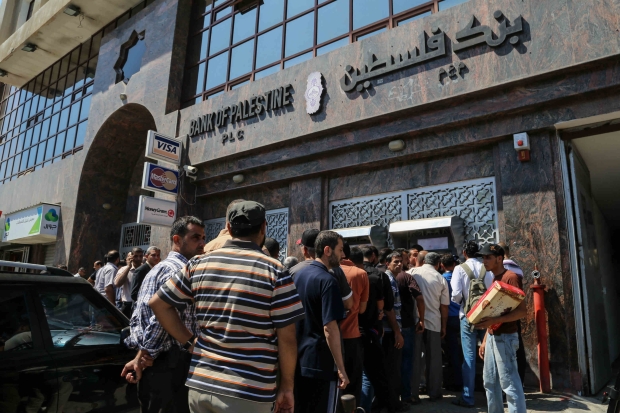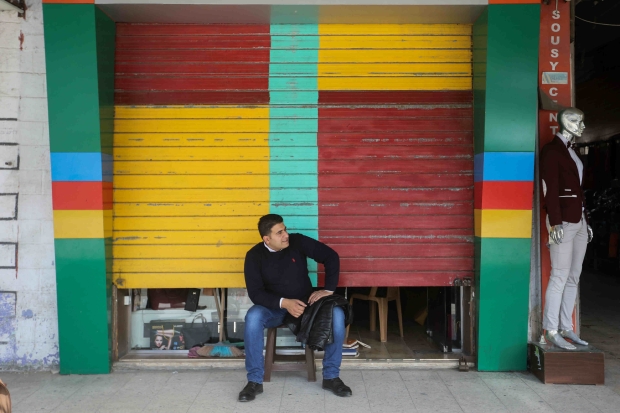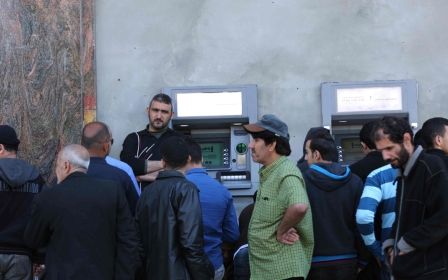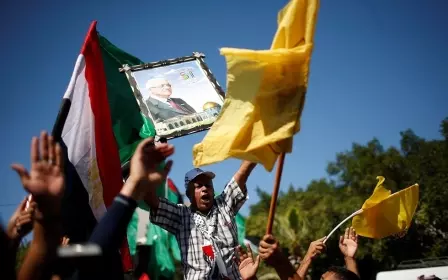'Soon I will be begging': PA salary cuts push Gaza closer to the brink
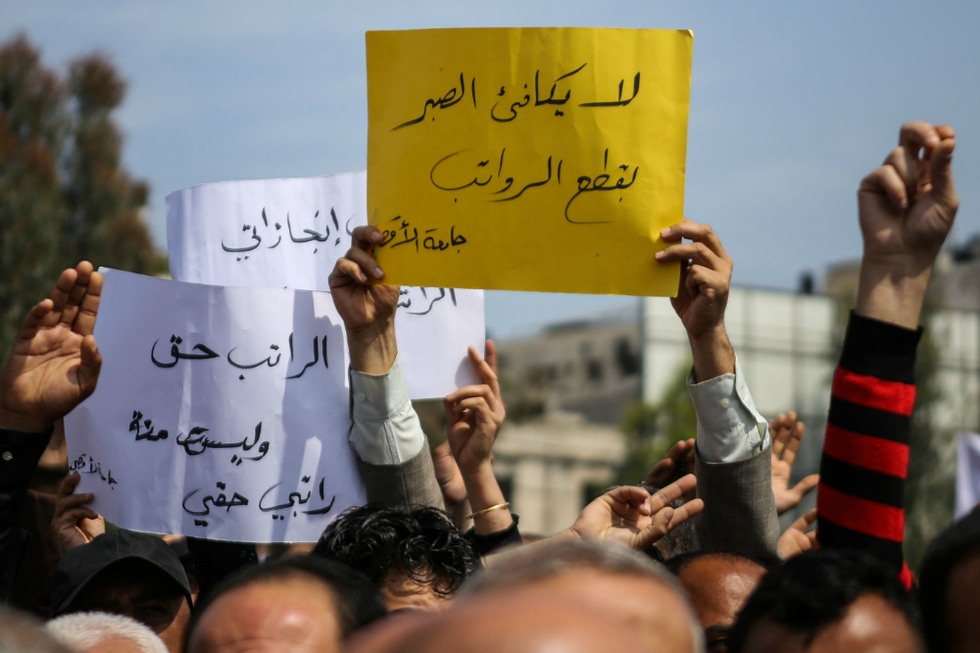
Bashir Abu Quneis had been waiting to get paid for almost a month.
When his March salary turned up on Wednesday, the 45-year-old father of five cried: his account had been credited with just 250 shekels - a paltry $69.
Abu Qunei’s colleague Bahaa al-Astal, had meanwhile received 300 shekels ($83). Others were not even that lucky. The cash they got had been immediately diverted in its entirety to cover their bank loans, leaving them with nothing.
We do not know why we are subjected to suffering in this way
- Bahaa al-Astal, paid $83 for a month
Without warning, the salaries of Abu Quneis, Astal, and the Palestinian Authority’s more than 50,000 employees in the Gaza Strip, had been cut in half - and this a year after the Palestinian Authority had slashed salaries by 30 percent.
In effect, Gaza civil servants’ salaries now stand at 35 percent of what they were in 2016.
“We do not know why we are subjected to suffering in this way,” Astal told Middle East Eye, trying to stifle back tears thinking about his family’s future in the besieged Palestinian territory - where some 80 percent of the population is dependent on foreign aid to survive.
For many of the civil servants, the latest round of payment delays and cuts is part of a deliberate tactic by the Fatah-led PA to pressure its rival Hamas, the ruling party in Gaza, effectively leaving them hostages to a decade-long bitter political dispute.
Days earlier, Palestinian President Mahmoud Abbas had shown no intention of lifting the PA’s pressure on the Gaza Strip, hinting at pursuing sanctions against rival party Hamas.
“I have informed Egyptian President Abd al-Fattah al-Sisi that the PA should have full control of Gaza, including of weapons and security,” Abbas said in his opening speech at the Palestinian National Council session in the West Bank city of Ramallah on 30 April. “Hamas is responsible for all the crises in the Gaza Strip.”
The PA wants to make clear to the Palestinians in the Gaza Strip that a good economy and their livelihoods are in the hands of PA
- Hisham Barakat, Palestinian political science professor
An armed conflict between Fatah and Hamas following the latter’s victory in 2006 legislative elections effectively booted the PA out of power in the Gaza Strip. Since then, the PA and Hamas have failed to resolve their acrimonious power struggle, with numerous attempts at forming a unity government falling flat, effectively leaving Gaza under the control of a Hamas-led administration separate from the PA operating in the West Bank.
Palestinians in Gaza have felt the consequences of the internal Palestinian political conflict, all the while suffering from an Israeli-imposed siege on the small coastal territory since 2007.
PA civil servants in the Gaza Strip have repeatedly been caught in the intra-Palestinian political crossfire.
Following Hamas’s rise to power in Gaza, the PA requested that its 55,500 civil servants in the Strip - many of whom were members of the Palestinian security forces - cease working under Hamas.
Today, only several thousand are estimated to still be working, mainly in health and education. Employees working in governmental roles under Hamas are not included in the PA’s payroll.
Organisers of Gaza's "Great March of Return" protests at the border with Israel have called for Friday's protest to highlight the plight of Gaza's workers and wider economic issues, including the enclave's 40 percent unemployment rate.
All PA civil servants in Gaza - whether working or not - have been affected by the financial issues. While the PA had initially claimed that the salary delays in Gaza were due to technical problems, civil servants had questioned that narrative, pointing out that employees in the West Bank had been paid on 9 April.
It remained unclear by publication time whether the 50 percent cut in March salaries is a permanent development that will also affect the April salaries, or if the PA was planning on delivering the other half at a later date.
PA spokesman Youssef al-Mahmoud did not respond to Middle East Eye’s repeated requests for comment on the issue.
This is not the first time that Gaza civil servants’ salaries have been in jeopardy. In 2017, the PA imposed a 30 percent pay cut on employees in Gaza in April - causing civil servants to take to the streets in protest - and forced 6,000 into early retirement in July.
The PA argued at the time that its decisions were caused by Hamas collecting government revenues in Gaza without sending them back to the Ramallah-based authority.
We should not be punished over the pretence of pressuring the Hamas movement, as it only thinks about its own interests and not ours
- Bahaa al-Astal
For political science professor Hisham Barakat, who teaches in several universities in Gaza, the recent issues faced by civil servants are a deliberate political move by the PA.
“Since Hamas gained control of Gaza, the PA has been thinking of how to gain back control, lest it look weak in front of the political parties that have weapons in Gaza,” he told MEE.
“The PA wants to make clear to the Palestinians in the Gaza Strip that a good economy and their livelihoods are in the hands of PA, and that Hamas only cares about its own interests.”
Barakat added that the PA was unhappy at Hamas’s efforts to build relationships with Qatar, Iran, and Lebanese group Hezbollah, and was seeking to reassert its influence in Gaza.
Political analyst Akram Atallah, meanwhile, said that the PA believes salary delays, in addition to other punitive measures levied in the Gaza Strip, will help it wrest back control of Gaza after 11 years.
“The PA believes that these measures are the first step to pressure Hamas to hand over the Gaza Strip to the PA, and I believe that the PA will continue the measures,” Atallah told MEE. “In this conflict, the Palestinian in the Gaza Strip are the victims."
Atallah said he believed the current crisis was due to a breakdown in the most recent Palestinian reconciliation agreement in late 2017.
According to Atallah, the PA's actions could either restore Palestinian unity and bring the Gaza Strip back under its control, or they could result in the permanent governmental secession of the Gaza Strip from the rest of the occupied Palestinian territory.
“There are no other alternatives,” he said.
A devastating trickle-down effect on Gaza’s economy
The crisis has left Abu Quneis and Astal in a precarious situation. The two men spend the majority of their days in public squares or walking in the streets, Abu Quneis only coming home late at night to avoid the visits of creditors demanding to be reimbursed.
I am totally distressed by this situation. Having children is what stops me from committing suicide.
- Ahmad al-Atal, Palestinian Authority employee in Gaza
Abu Quneis told MEE that he had to stop taking medicine for his cardiac problems so he could afford to feed his children.
Astal’s daughter, meanwhile, dropped out of university because he could not afford the enrolment fees.
Meanwhile, Ahmad al-Atal, a former PA police officer, was evicted from his home in late April for failing to pay three months’ worth of rent. He now lives with his family in a room in his brother’s house while trying to find a more permanent solution.
“We cannot tolerate these conditions any more, we will take to the streets until they give us a better economic situation,” Atal said.
The 42-year-old said he was not the only one to have been forced out of his home because of his dire financial situation. Of his salary of $215, he said, $147 was going to rent, forcing him to borrow money from friends and family to feed his five children, while he and his wife often went without food.
“PA employees are traumatised,” Atal told MEE. “Most of my salary goes to pay back a bank loan. With the PA cuts, I think I will be begging soon, as I have nothing left to lose.
“I am totally distressed by this situation. Having children is what stops me from committing suicide.”
The PA salary cuts have a reverberating impact on Gaza society, as the stringent Israeli siege, propped up by Egypt’s Sisi since 2014, has had a devastating effect on the economy.
“The Gaza Strip depends on the PA employees’ salaries as a propeller of demand,” Mohammed al-Mansi, the public relations officer for the Palestinian Federation of Industries in Gaza, told MEE. “Every employee has between five and 10 people depending on them. We do not have natural resources, we depend on donor aid and employees' salaries.”
Al-Mansi stressed that the civil servants’ salary cuts had slowed down the general Gaza economy, claiming that purchasing power in Gaza had dramatically decreased since the April 2017 pay cuts, and that many of the Strip’s factories had stopped production due to a drop in consumer demand, in addition to gruelling electricity cuts, and the restrictions on imports due to the siege.
"Gaza is suffering from an economic, social and humanitarian disaster. If this continues, there will be an explosion, because there is no hope of lifting the siege on the Israeli side, or even of lifting the PA’s sanctions on the Gaza Strip," Mansi said.
The situation has left its people in Gaza disillusioned about Palestinian leadership, both in Hamas and the PA, who they believe show no concern for the well-being of the population.
“Why should the people and children have to bear the burden of these punishments in a besieged area? We should not be punished over the pretence of pressuring the Hamas movement, as it only thinks about its own interests and not ours,” Astal said.
“In April 2017, we protested against the PA’s decision to deduct 30 percent of our salaries, but this was in vain,” Abu Quneis said.
“Our souls have died, and no one senses our suffering.”
New MEE newsletter: Jerusalem Dispatch
Sign up to get the latest insights and analysis on Israel-Palestine, alongside Turkey Unpacked and other MEE newsletters
Middle East Eye delivers independent and unrivalled coverage and analysis of the Middle East, North Africa and beyond. To learn more about republishing this content and the associated fees, please fill out this form. More about MEE can be found here.


